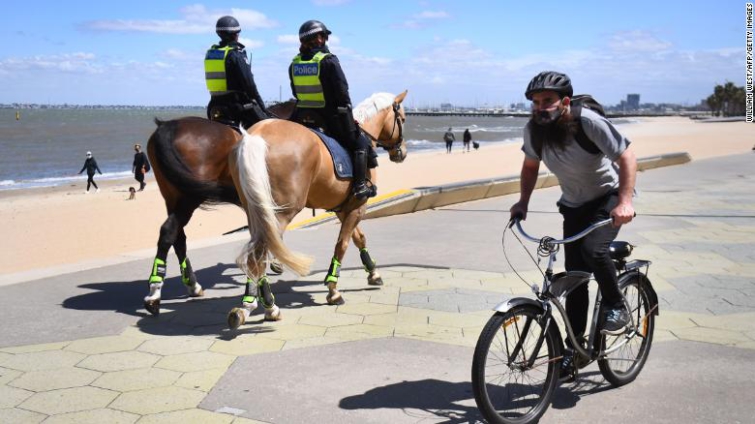Australia registered no new local Covid-19 cases on Saturday for the first time since June 9, marking a major milestone in the country's battle against the deadly virus.
The apparent turning point comes just months after Victoria declared a "state of disaster" to stem an outbreak that saw as many as 725 people in a single day test positive for the virus in the Southeastern state.
"The 1st national zero community transmission day since June 9," Health Minister Greg Hunt said on Twitter on Sunday." Thank you to all of our amazing health & public health workers & above all else the Australian people."
Advice just in from the National Incident Centre - Zero community transmission cases today Australia wide- the 1st national zero community transmission day since June 9. Thankyou to all of our amazing health & public health workers & above all else the Australian people.
— Greg Hunt (@GregHuntMP) November 1, 2020
Meanwhile, Melbourne, the city at the epicenter of Australia's coronavirus epidemic, marked its second consecutive day without any locally transmitted cases. Since ending its strict 112-day lockdown on Tuesday, the city of 5 million has registered only seven new local Covid-19 cases.
Though Victoria, of which Melbourne is the capital, accounts for at least 20,300 of Australia's more than 27,500 coronavirus cases, the number of active cases in the state has steadily declined in the past 30 days.
Prior to Sunday's announcement, the number of new infections in Victoria had been in single digits since October 13. In early August, Victoria was recording hundreds of cases per day, leading state authorities to implement the type of strict anti-epidemic measures that governments in Western Europe and the United States have been hesitant to enact out of fear of damaging the economy.
This included placing Melbourne residents under a strict seven-week lockdown and barring nearly all trips outdoors. The federal government also closed the state's borders to non-essential travel.
Though the decision to lockdown Melbourne was unpopular with some people, by late September, cases had declined to low double-digits, allowing the government to begin lifting restrictions. Authorities in the state have said they would consider lifting more restrictions if trends continue in the right direction.
Latest Stories
-
Ghana-Russia Centre supports pupils of Pakro-Zongo basic school
1 hour -
Ghana launches Malaria Youth Corps, leveraging youth power in fighting malaria
2 hours -
Book Review – All’s Well (Feehi): Living a Life Guided by Grace by Abednego Okoe Feehi Amartey and Theodora Dame Adjin-Tettey
3 hours -
French for health: A new initiative by French Embassy in Ghana
9 hours -
Ghana slowly retracing steps back to path of macroeconomic stability – Deloitte
9 hours -
Ghana’s debt service-to-revenue ratio reached all-time high of 127% in 2020, highest in SSA – IMF
9 hours -
Ghana’s consolidation efforts under IMF progamme to continue to be based on revenue
10 hours -
GPL 2024/25: Hearts beat 3-1 Chelsea to return to winning ways
11 hours -
Ghana set to host second Flag All-Star Game in Accra
11 hours -
Angor CREMA: Empowering Ghana’s coastal communities for sustainable growth
12 hours -
The Legon VC… and childhood memories
12 hours -
The absurd inequality of climate work: Overcoming dilemmas in the green transition
13 hours -
ORAL team receives first dossier of ¢500m National Service ghost names scandal
13 hours -
AfroFuture’s Culture Beach Jam comes off Dec. 28 & 29
13 hours -
NDC gov’t to address first quarter expenditure after January 7 – Ato Forson to Ghanaians
13 hours

